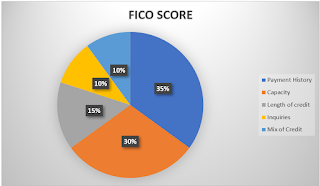The Three Basics of
Investing
By
Zach Potojecki
In today’s world there is a wide range of investment
vehicles where an individual can place their money. There are stocks, bonds,
Certificate Deposits (CDs), and many more. With different financial
institutions on every other corner, how do you know which is the best option
for you? In this article I will be breaking down the three most popular
investment vehicles in hopes that you find what works best for you as you venture
into the world of investing.
Let’s start with the basics of stocks. When you purchase a
share of stock, you are actually purchasing a small percent of that company. If
the company does well, then the shares of that stock will increase in value.
However, if the company is performing poorly, then the price of the stock may
decrease. Stocks typically have higher upside potential when compared to bonds
or CDs in the long run. When I mention “long run,” I’m talking about 5-10 years
or more. With this in mind, they also have the largest downside since you can
lose your entire principal, plus any transaction fees that your broker may
charge you. This goes with the old saying, “higher risk requires higher
return.”
Bonds are debt instruments issued primarily by governments
and corporations. You pay them a principal payment, and over the course of the
bond’s lifetime you will be paid back your principal plus interest. Bonds are
considered less risky than stocks, but as a result, they deliver less of a
return than stocks in the long term.
Certificate Deposits, or CDs for short, are investment
vehicles that you can purchase at your local banking institutions such as URW.
For example, a member can purchase a five-year CD for $5,000, URW will pay the
member interest over the course of the five years, and at the end of the five
years URW will repay the member the full $5,000 purchase price plus interest. A
CD may be the least risky investment vehicle that you can put your money into.
You cannot lose your principal payment because we are insured up to $250,000
per individual. So that means if you have a CD and list 3 other people as
beneficiaries, then you are insured up to $1,000,000. The same goes for our
Individual Retirement Accounts (IRAs). IRAs are a completely different subject,
and we will be touching on them in our next blog.
Now back to the part about which option is best for you. When
it comes to choosing which investment vehicle is best for you, your age and
risk tolerance will play a large factor in this decision. If you have a longer
time horizon (early 20s or 30s), you still have quite a while before you retire
and therefore have a longer time to ride out risks. The young investor may want
to invest in higher return assets such as stocks. If you’re nearing retirement
and want to protect your nest egg, a CD could be the right option for you. CDs
will allow you to avoid large drops in the stock market and give a more
consistent return. The best part is that typically credit unions offer higher
interest rates on their CDs and their IRAs because we are a non-profit
organization.
For more details on our current rates, visit our webpage at https://www.urwfcu.org/
and click on “view current rates,” or stop by and visit one of our many
locations.
On a side note, if you are very new to investing in general,
whether it be an IRA or your work’s 401K, I would recommend following this
link: https://www.amazon.com/Automatic-Millionaire-Expanded-Updated-Powerful/dp/0451499085
If you are a little more experienced investor and want to
learn much more, then I would recommend following this link: https://www.amazon.com/Random-Walk-Down-Wall-Street/dp/0393358380/ref=pd_lpo_14_t_0/139-2123526-0978503?_encoding=UTF8&pd_rd_i=0393358380&pd_rd_r=608b0c39-f117-45a2-9487-53530f3ea6fb&pd_rd_w=82xul&pd_rd_wg=nTtNq&pf_rd_p=7b36d496-f366-4631-94d3-61b87b52511b&pf_rd_r=PYZXNXKGFMSVSXMWBXJY&psc=1&refRID=PYZXNXKGFMSVSXMWBXJY
These are two very inexpensive books that can both be
purchased for roughly $25 combined and are a wealth of knowledge.
Disclaimer: Neither I (Zachary
Potojecki) or URWFCU are registered as a securities broker-dealer or an
investment adviser either with the U.S. Securities and Exchange Commission
(the”SEC”) or with any state securities regulatory authority. I am neither
licensed nor qualified to provide investment advice. The blogs that are written
by me and posted by URWFCU are for educational purposes only.



Comments
Post a Comment